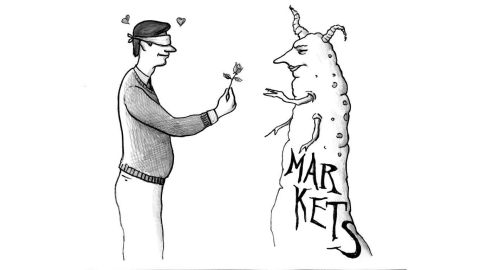Market Lovers Mustn’t Hate What Their Love Needs

The pop logic of free markets is fatally flawed. And many professional market lovers are so besotted, they’re blind to their beloved’s faults. Worse, many hate what their love needs to be healthy. Seen clearly, “invisible hand” logic demands this love-hate be reconciled. Markets, without perfect prices, are like doctors whose tests are inaccurate. They can’t decide what’s best.
Market logic, having many moving parts, isn’t nearly as simple or benign as market-lovers often preach. Adam Smith famously said “he who intends only his own gain…is…led by an invisible hand…[and] frequently promotes [the interest] of…society.” Smith was careful to say “frequently promotes,” not “always ensures.” He knew markets were no panacea.
As Gavin Kennedy notes the “invisible hand” was a popular literary metaphor in Smith’s day (Augustine and Shakespeare used it.) But economists mostly ignored it until the 1950s, when Paul Samuelson elevated Smith’s minor metaphor, used only three times and applicable in limited cases, to a general organizing principle. Samuelson conflated it with perfect competition and promoted the claim that it guaranteed “the best good of all” to the millions trained on his textbook.
But markets can produce unintended harms as well as benefits. Desirable transactions don’t always produce desired market outcomes.
In logic this is called “the fallacy of composition”: Aggregates can be simple or complex, so the properties of parts needn’t apply to wholes. Here’s a silly example: All atoms in an apple are invisible; therefore, the apple is invisible. Claims about free markets can be a world-threateningly serious example. The idea that markets composed of voluntary, so assumed to be desirable, and locally “rational” decisions aggregate to “rational” and desirable outcomes is empirically false. Few buy coffee intending to pollute. But the parts of markets together create (collectively undesirable) pollution.
Free markets have built-in incentives to create distorting errors. Economists call these “negative externalities” which Paul Krugman says are “costs that people impose on others…yet have no individual incentive to” factor into their decisions. And these needn’t be small errors (e.g. the $200 hamburger). Pollution is a classic example. Two cures are known: Either regulate, or tax to adjust incentives. Yet many market-lovers resist that simple logic, usually for non-market reasons. Only if selfish gain didn’t trump collective harm, or if prices perfectly included full costs (no externalities), could markets collectively optimize. Neither condition applies in any real market. Though many market lovers hate the idea, only an independent government-like entity can police and correct real markets. Without guidance, markets coordinate mindlessly (see “Markets Dumb as Trees”).
As Joseph Stiglitz notes the “invisible hand often seems invisible” because, like the Emperor’s New Clothes, “it is not there.” Only biased reasoning and collective denial prevent better use of markets. The supposed automatic alchemy of solo greed transforming into social good is idealized, love-struck, and impractical. Real lovers of real markets must deal with their ills. Without the medicine of regulation or taxation, however distasteful, their beloved markets can’t thrive. It’s time we all were market realists.
Illustration by Julia Suits, The New Yorker Cartoonist & author of The Extraordinary Catalog of Peculiar Inventions.




